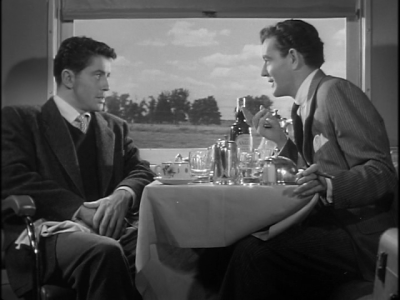
Raymond Chandler to Alfred Hitchcock, Dec. 6, 1950:
Dear Hitch,
In spite of your wide and generous disregard of my communications on the subject of the script of Strangers on a Train and your failure to make any comment on it, and in spite of not having heard a word from you since I began the writing of the actual screenplay — for all of which I might say I bear no malice, since this sort of procedure seems to be part of the standard Hollywood depravity — in spite of this and in spite of this extremely cumbersome sentence, I feel that I should, just for the record, pass you a few comments on what is termed the final script. I could understand your finding fault with my script in this or that way, thinking that such and such a scene was too long or such and such a mechanism was too awkward. I could understand you changing you mind about the things you specifically wanted, because some of such changes might have been imposed on you from without. What I cannot understand is your permitting a script which after all had some life and vitality to be reduced to such a flabby mass of clichés, a group of faceless characters, and the kind of dialogue every screen writer is taught not to write — the kind that says everything twice and leaves nothing to be implied by the actor or the camera. Of course you must have had your reasons but, to use a phrase once coined by Max Beerbohm, it would take a ‘far less brilliant mind than mine’ to guess what they were.
Regardless of whether or not my name appears on the screen among the credits, I’m not afraid that anybody will think I wrote this stuff. They’ll know damn well I didn’t. I shouldn’t have minded in the least if you had produced a better script — believe me, I shouldn’t. But if you wanted something written in skim milk, why on earth did you bother to come to me in the first place? What a waste of money! What a waste of time! It’s no answer to say that I was well paid. Nobody can be adequately paid for wasting his time.
Raymond Chandler
John Steinbeck, Thornton Wilder, and Dashiell Hammett had already turned down the job. When Chandler finally did hear from Hitchcock, it was to learn he’d been fired.
